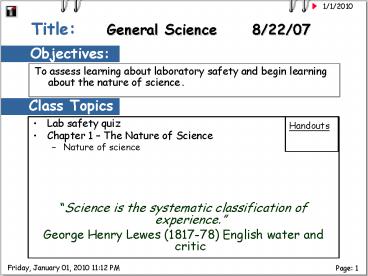Lab safety quiz - PowerPoint PPT Presentation
1 / 12
Title:
Lab safety quiz
Description:
... systematic classification of experience.' George Henry Lewes (1817-78) English water and critic ... To assess learning about laboratory safety and begin ... – PowerPoint PPT presentation
Number of Views:58
Avg rating:3.0/5.0
Title: Lab safety quiz
1
Class Topics
Title General Science 8/22/07
Objectives
- To assess learning about laboratory safety and
begin learning about the nature of science .
Handouts
- Lab safety quiz
- Chapter 1 The Nature of Science
- Nature of science
- Science is the systematic classification of
experience. - George Henry Lewes (1817-78) English water and
critic
Friday, January 01, 2010 1111 PM
2
Class Assignments
By When
What
- Safety Quiz 8/22/07
- Read 2-11 8/23/07
- Due this class period
- Due next class period
- Due in the future
3
Postquiz activities
- Read 2-11
- Read 2-11
- Read 2-11
- Read 2-11
4
Science From Curiosity
- What is Science?
- A system of knowledge and the methods you use to
find that knowledge. - Science begins and ends with curiosity.
- Observations
- Qualitative
- Descriptive observations. Ex. Blue, Green, Big,
and Small. (no numbers) - Quantitative
- Numerical. Ex. 1,2,3,...
5
Qualitative vs Quantitative observations
- Read the following quote
- "When you can measure what you are speaking
about, and express it in numbers, you know
something about it but when you cannot measure
it, when you cannot express it in numbers, your
knowledge is of a meager and unsatisfactory kind
it may be the beginning of knowledge, but you
have scarcely, in your thoughts, advanced to the
stage of science." - Lord Kelvin, 1894
6
Science and Technology
- What is technology?
- Def. The use of knowledge to solve practical
problems. - Ex. Anything.
- Science and technology are interdependent.
- Ex. Development of alternative fuels.
- Biodiesel, windfarms
7
Branches of Science
- Natural science is divided into three branches.
- Physical Science
- Earth/Space Science
- Life Science
8
Branches of Science (cont.)
- 1. Physical Science
- Chemistry - The study of the structure,
properties, and reactions of matter. - Physics - The study of matter and energy through
forces and motion.
9
Branches of Science (cont.)
- 2. Earth Space Science
- Geology
- The study of the origin, and structure of Earth
(Earth Science) - Astronomy
- The study of the universe (Space Science)
- 3. Life Science
- Biology
- The study of living things
10
The Big Ideas of Physical Science
- 1. Space and Time.
- Universe 13.7 billion years old.
- 700 million billion billion meters in diameter.
- 2. Matter and Change.
- Matter is anything that has mass and volume. Ex.
Solid, Liquid, and Gas. - Atoms are the building blocks of matter.
11
The Big Ideas of Physical Science (Cont)
- 3. Forces and Motion.
- Forces cause changes in motion.
- Push, Pull, Friction, Gravity, etc
- 4. Energy
- Kinetic Energy - Moving energy.
- Potential Energy - Stored Energy.
- Energy can not be created or destroyed,
12
Using a Scientific Approach.
- What is the goal of a scientific method?
- How does a scientific law differ from a
scientific theory?































